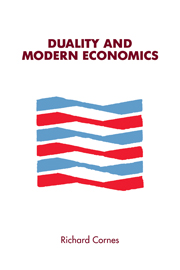Book contents
- Frontmatter
- Contents
- Preface
- PART I SOME BACKGROUND
- PART II MODELING INDIVIDUAL CONSUMER AND PRODUCER BEHAVIOR
- Chapter 2 Individual consumer behavior: Direct and indirect utility functions
- Chapter 3 Individual consumer behavior: Expenditure and distance functions
- Chapter 4 Individual consumer behavior: Further useful relationships and formulations
- Chapter 5 Producer behavior
- Chapter 6 Consumer and producer behavior: More useful topics
- Chapter 7 Consumer theory with many constraints
- PART III APPLYING THE MODEL OF INDIVIDUAL BEHAVIOR
- Epilogue
- Bibliography
- Author index
- Subject index
Chapter 5 - Producer behavior
Published online by Cambridge University Press: 11 September 2009
- Frontmatter
- Contents
- Preface
- PART I SOME BACKGROUND
- PART II MODELING INDIVIDUAL CONSUMER AND PRODUCER BEHAVIOR
- Chapter 2 Individual consumer behavior: Direct and indirect utility functions
- Chapter 3 Individual consumer behavior: Expenditure and distance functions
- Chapter 4 Individual consumer behavior: Further useful relationships and formulations
- Chapter 5 Producer behavior
- Chapter 6 Consumer and producer behavior: More useful topics
- Chapter 7 Consumer theory with many constraints
- PART III APPLYING THE MODEL OF INDIVIDUAL BEHAVIOR
- Epilogue
- Bibliography
- Author index
- Subject index
Summary
From the point of view of duality theory, the ideas that we have encountered in consumer theory carry over very naturally into the analysis of production. There are no fundamentally new ideas, simply old ones in a slightly different guise. Whereas the consumer can be thought of as using commodities to generate utility, the production plant uses factor inputs to generate output, and thereby profits. The principal differences are as follows: First, utility is a derived concept, whereas output is a primitive concept. Second, production theory has to be able to deal with situations involving vectors of many outputs, whereas the consumer's output, utility, is a scalar. Finally, the precise forms of the objectives and constraints usually assumed in producer theory imply the absence of any response analogous to the real income component of a consumer's price response. The extension to many outputs does not greatly complicate matters if duality is properly exploited, and the two remaining features of production theory serve, if anything, to simplify it.
Direct and indirect production functions
Let us begin by considering the production of a single homogeneous output, y, from a vector of input services, ℓ A common description of the production possibility set specifies the maximum attainable output as a function of the input vector.
- Type
- Chapter
- Information
- Duality and Modern Economics , pp. 104 - 138Publisher: Cambridge University PressPrint publication year: 1992



